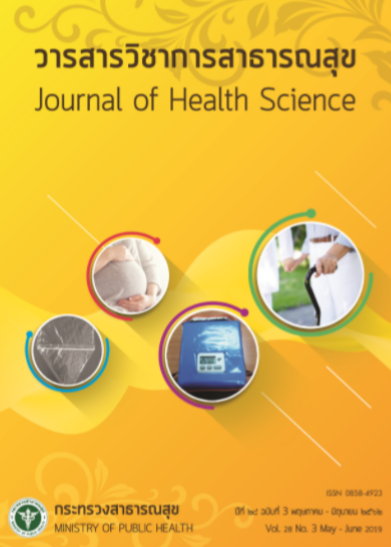Health Behavior Adjustment Model for High-Risk Diabetes Mellitus in Srisatchanalai district, Sukhothai Province
Keywords:
model of health behavior adjustment, group of high risk behavior to diabetes mellitusAbstract
The objectives of this research were to study the knowledge and behaviors of a diabetes mellitus high risk group in Srisachanalai district, Sukothai province, and to develop an appropriate model of their health behavior adjustment. The population consisted of 898 people with high risk to diabetes mellitus in Ban Kaeng sub-districts, of whom 330 samples were purposively selected, with 25 stakeholders and 43 volunteers from the risk group to join a behavior adjustment project. Six sets of data collection instruments were developed with passed the content validity and statistical reliability tests. The collected data were analyzed by using frequency distribution, percentage, means, standard deviation, Pearson correlation, paired t–test, and content analysis. It was found that the samples had a moderate level of knowledge and health behaviors relating to diabetes mellitus. Both the risk group and health officers realized that they had different understandings towards the distributed contents of diabetes mellitus prevention, causing high risk consequences. The overall health knowledge and behaviors of the samples relating to high risk diabetes were found to be higher than those of the pre-adjustment project (p<0.001). The researchers and stakeholders applied those data to develop a model for health behavior adjustment with 6 activities, which included: (1) comparing their understanding of and learning including provision needs; (2) reassuring their understanding and operational adjustment by using community forum for skill development to knowledge approach with content understanding; (3) planning an interpretation of the risk behavior plan; (4) returning a data feed back to the community and health officers as their lessons of the appropriate application of such developed model and procedures; (5) monitoring after action review and empirically found better knowledge understanding and behaviors; and (6) this model was found to be an appropriate approach to increase knowledge, understanding and awareness regarding the risk behaviors of diabetes mellitus; leading to the change among health officers in disseminating knowledge on behavior adjustment with better understanding of the samples. A further application of this participatory model was recommended.
Downloads
Downloads
Published
How to Cite
Issue
Section
License
Copyright (c) 2019 Journal of Health Science - วารสารวิชาการสาธารณสุข

This work is licensed under a Creative Commons Attribution-NonCommercial-NoDerivatives 4.0 International License.







